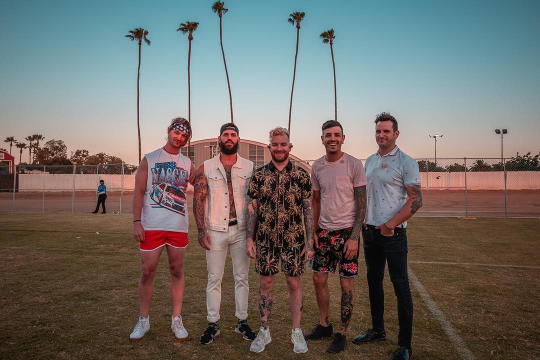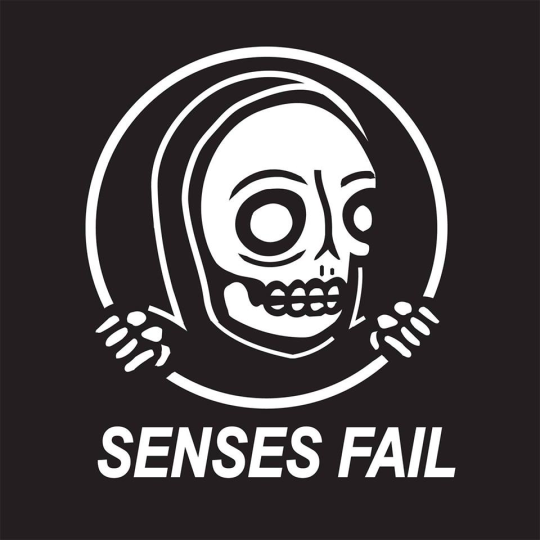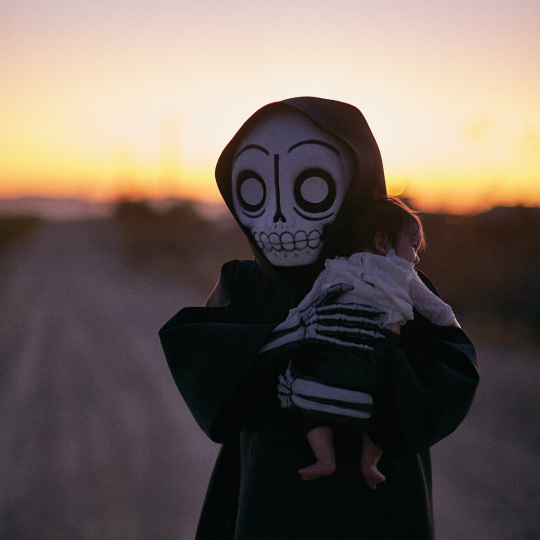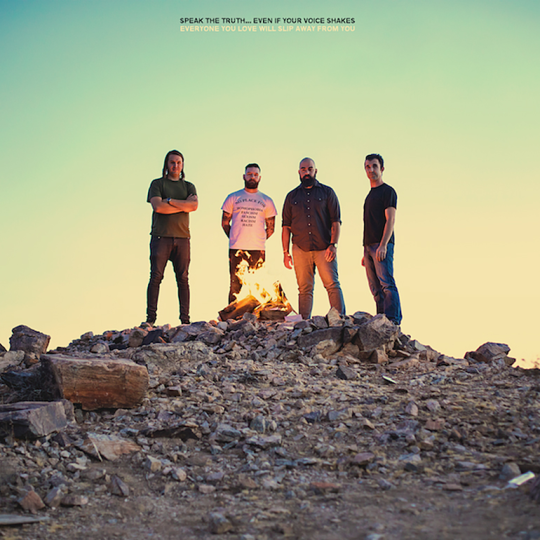
This interview previously aired on idobi Radio and is for everyone who was too lazy to tune in. Enjoy!
If you’ve been paying close attention to the site and our Noise socials over the past couple weeks, you’ve probably realized that we spent a good amount of time at the last ever Vans Warped Tour recently.
Hitting up Pomona, Ventura, and Phoenix to soak in Kevin Lyman’s last ever punk rock summer camp, while we were there, we were able to spend our time talking with a few kickass bands – bands like sensational scene staples, Senses Fail.
Catching up with beloved and influential frontman Buddy Nielsen, we were able to discuss what the music world might look like after Warped Tour sadly comes to an end as well as how Senses Fail’s killer new album If There Is Light It Will Find You came together.
To check out our chat with Buddy, be sure to look below. Afterward, make sure to pick up a copy of Senses Fail’s new LP here.

We’re five dates into Warped Tour, what has been your highlight so far?
Buddy Nielsen: I think our highlight was definitely headlining the first day and having a couple thousand people watching us play the last Warped Tour in Southern California.
What bands have you found yourself watching the most out on Warped Tour?
You know, I honestly haven’t watched really anyone. It’s been [about] acclimating to the lifestyle of Warped Tour. You know, we have thousands of people every day and hundreds of people on the tour and you’re kind of going and moving throughout the day doing press and lunch and signings and playing so… I’ve watched The Used [laughs]. That’s who I’ve watched.
So not giving too much away, you guys are doing a pretty cool medley during your set. What was behind that idea?
We had played a couple of rock festivals over the spring and just wanted to – you know when you play festivals, not everyone knows who your band is. Maybe they know who your band is but they don’t know more than one song and you want the people watching you to have a good time. You’ll notice out here, older bands who have done a lot of these will play covers ‘cause they know it’ll get the crowd into it in a way that maybe their original songs wouldn’t do. So it’s nice to do that and we just figured instead of doing a full cover, which you know can get a little boring, we’ll do the most memorable parts of like four or five songs and people can kind of have a fun time hearing a bunch of things that are familiar. Then we play pretty much our biggest song afterward so it’s kinda like “here’s a bunch of songs you know and then if you only know one song by us here’s probably the one song you know.”
That’s smart. That’s kind of how it works with the Emo Night culture we currently live in where you only play the best parts of the song.
Yeah. Some of the songs when I DJ, it’s a good song but the most memorable part is really one part and [after] it’s like, “Man, do I have to play the rest of the song?” [laughs] I don’t know, it’s just figuring out how people want to listen to music I guess.
So speaking of rock festivals, with Warped Tour going away, do you see rock festivals being the future of this scene? Maybe trying to get into that active rock radio world?
Probably, I mean I definitely think it’s a goal of ours. I think we work well with a lot of those fans ‘cause we’re kind of a big loud rock band. I think you kinda gotta be a big loud rock band to make that work there. So I think for some bands, it’ll work out and be something they can do and for some bands, it’s just not really their thing to be a flashy, loud, in-your-face rock band. I think that goes over really well in that world or at least people are more attentive ‘cause that’s kind of what they’re looking for, you know? So I mean, it’s definitely an option for people.
With Warped Tour being such a big impact on your band’s career, what do you think this scene is going to look like without it to help break the next big bands?
I don’t know, I think people are going to maybe work a lot harder. I think people are going to have to be a little more original. I mean, if you look around the current landscape of bands who are doing really well, a lot of them are bands who pushed through adversity and have stuck around – The Maine, Our Last Night, Dance Gavin Dance. Some of the biggest bands in the music scene right now are bands that people don’t generally even consider big bands but they have these massive fan bases who are dedicated to them. So I think it’s gonna take a lot more work. And I think its gonna filter out some bands that kind of look at this as a hobby that turned into a thing they can do and then they’re out of it in their mid 20’s. That’s generally how most bands work – start in high school or college age and then you kind of get into your mid-to-late 20’s and you either have the success you wanted or you didn’t. And that’ll decide whether or not you’re gonna stay or go. And really, there’s only like a core set of bands that will end up sticking around anyways because either they gained a level of success or they have a drive and determination like those bands I listed who a couple of them don’t even have a label, don’t have managers, they do everything on their own.
I see the future of this music scene being very much that since none of the bands are getting radio or anything. So everything is DIY. If you’re not very DIY and creative with how you’re interacting with your fans and what you’re giving them, then I think you’re gonna have a hard time retaining them or even finding them because there’s gonna be no Warped Tour like this for “Hey, check this band out.” I think it’s getting a little bit tougher for bands to also maintain ‘cause everyone is gonna have to be a headliner. So if you’re not a headlining band, you’re gonna be vying with the same couple bands that are headlining and if you don’t get one of those [tours] you’re gonna have to go out and headline … We were forced to headline for a long time and, the same thing as a lot of those bands I mentioned, because we weren’t getting support tours for various reasons that really forces you to be not just creative but like a band people want to come see [laughs]. You have to figure it out. You’re like, “Well, we’re headlining. What are we gonna do to make people come see us?”
Does that freak you out at all for the future?
No, not for us. We’ve already been in this situation for years. For me, I think it almost levels the playing field a little bit. It almost makes it like – a lot of people are going to have to step into the world of these more working-class bands [and] you’re gonna have to really prove your worth in order to sustain. You’re not gonna be handed something, not that you’re handed anything but you’re just not gonna get this opportunity every year or two years to ride a wave. You’re gonna have to really create that for yourself and you know it’s a difficult thing to do. It’s a daunting task and I think unfortunately there will be some bands finding it hard to survive without Warped Tour. Which in turn, makes less competition but also more in a strange way [laughs]. But I don’t know what’s going to happen, there’s a lot of talk. A lot of industry people are talking about how it’s gonna hurt a lot of middle-class bands that can headline but don’t headline that often and use the Warped Tour to release their records and it’s gonna kinda be a tough spot for some bands, labels too especially. ‘Cause a lot of labels rely on this to push their new artists. Like where are you gonna break new bands? I don’t know. You’re really gonna have to be creative and also kinda tough it out.
Our first tour, well, we got lucky. We were with Finch. But then after that, I mean, we got lucky. We did a little of both. We headlined, we supported in the beginning. But like, I remember we headlined with My Chem[ical Romance] and there was no one there. I mean, we were doing tours with nobody. Playing with My Chem with 20 people there. Just stuff like that, we got very lucky. It wasn’t like we were doing that for years but it was still a reality that I think a lot of bands don’t necessarily have as much anymore because they’ll be on a label, they get the support tour, they do the Warped Tour, they play some of the festivals and then they keep getting support and they never really do that headliner that sucks [laughs]. You know, and they don’t get that taste of like, “Oh shit.” Playing in front of other band’s crowds is a lot different than cultivating from our own. [It’s] like two separate types of deals. So I don’t know, it’ll be interesting.
Do you find yourself talking to smaller bands that are on Warped Tour and giving some advice?
Not really. Everyone has to figure out their own thing. There’s really no level of advice. Like my situation is insanely different than a 20-year-old who is in a band with five people equally. I’ve been through a lot of different variations of the music industry, you know what I mean? So like, I wouldn’t even know where to start other than to tell them to go headline and figure out what it is people should like about your band and then you can sort of in a way cultivate that and make that what you’re about. But if you don’t have that, it’s really hard – outside of a festival type thing – to impart that on to your crowd if you don’t even necessarily know what your band is.
Well talking about working hard, I feel like from late 2016 to early 2017 you busted your ass. You worked on the acoustic Senses Fail EP, you did the project with the Finch guys (Speak the Truth… Even If Your Voice Shakes) and you wrote If There Is Light, It Will Find You. What was that like creatively? Were you just go, go, go from one project to the next?
Yeah, it was great. I really liked that. I kinda realized I needed that aspect of my life to be creative [and] to kinda keep all the noise [that’s] in my head away and I can really throw it all into music. I kinda liked that cycle a little better. I’m already working on new stuff and a couple of different ideas.

With If There Is Light It Will Find You being a little nostalgic for you, do you feel like that was inspired by working with the Finch guys?
Maybe a little bit. I think I saw how much people liked that [nostalgic vibe] and was like, “Well, I could very well do this with Senses Fail too.” So, in some ways, I think it was a bridge to that.

With this record doing so well with you writing primarily everything, was that eye-opening for you?
Yeah, I mean definitely. I’d never really done anything like that so it was really like, “let’s see what happens.” So it’s definitely how I’ll probably approach the next one.
I’m sure it was a relief for you because I know you put a lot of pressure on this record after having your daughter and everything like that…
Yeah definitely. It would have been kind of a bummer – .that’s probably too small of a word – if it wasn’t successful. But that’s generally how success happens, you kinda gotta go all or nothing or else you probably won’t make something meaningful or good.





